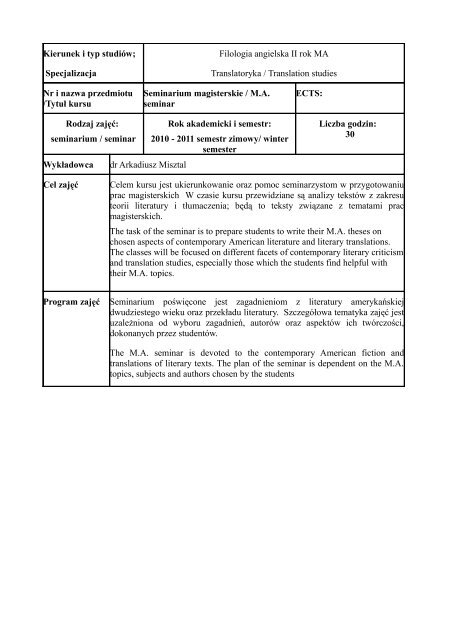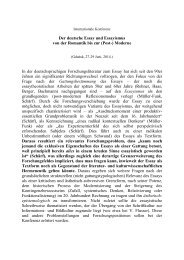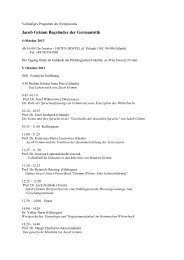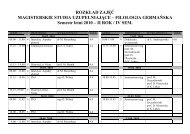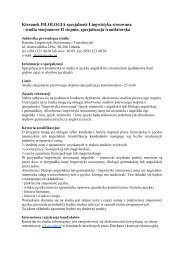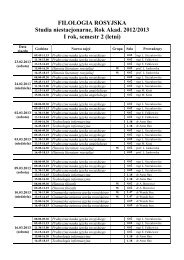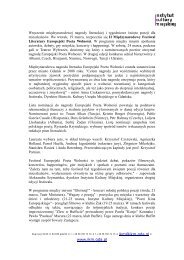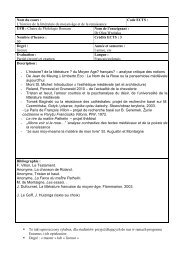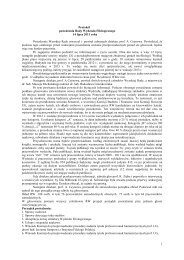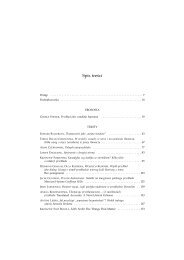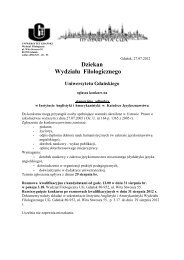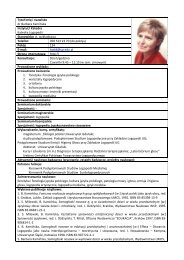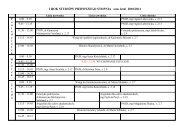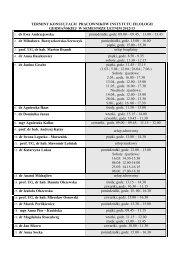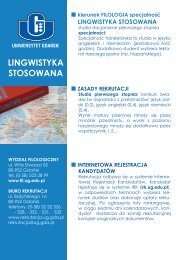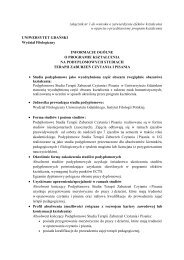Kierunek i typ studiów; Specjalizacja Filologia angielska II rok MA ...
Kierunek i typ studiów; Specjalizacja Filologia angielska II rok MA ...
Kierunek i typ studiów; Specjalizacja Filologia angielska II rok MA ...
Create successful ePaper yourself
Turn your PDF publications into a flip-book with our unique Google optimized e-Paper software.
<strong>Kierunek</strong> i <strong>typ</strong> <strong>studiów</strong>;<br />
<strong>Specjalizacja</strong><br />
Nr i nazwa przedmiotu<br />
/Tytuł kursu<br />
Rodzaj zajęć:<br />
seminarium / seminar<br />
Wykładowca dr Arkadiusz Misztal<br />
Seminarium magisterskie / M.A.<br />
seminar<br />
<strong>Filologia</strong> <strong>angielska</strong> <strong>II</strong> <strong>rok</strong> <strong>MA</strong><br />
Translatoryka / Translation studies<br />
Rok akademicki i semestr:<br />
2010 - 2011 semestr zimowy/ winter<br />
semester<br />
ECTS:<br />
Liczba godzin:<br />
30<br />
Cel zajęć Celem kursu jest ukierunkowanie oraz pomoc seminarzystom w przygotowaniu<br />
prac magisterskich W czasie kursu przewidziane są analizy tekstów z zakresu<br />
teorii literatury i tłumaczenia; będą to teksty związane z tematami prac<br />
magisterskich.<br />
The task of the seminar is to prepare students to write their M.A. theses on<br />
chosen aspects of contemporary American literature and literary translations.<br />
The classes will be focused on different facets of contemporary literary criticism<br />
and translation studies, especially those which the students find helpful with<br />
their M.A. topics.<br />
Program zajęć Seminarium poświęcone jest zagadnieniom z literatury amerykańskiej<br />
dwudziestego wieku oraz przekładu literatury. Szczegółowa tematyka zajęć jest<br />
uzależniona od wyboru zagadnień, autorów oraz aspektów ich twórczości,<br />
dokonanych przez studentów.<br />
The M.A. seminar is devoted to the contemporary American fiction and<br />
translations of literary texts. The plan of the seminar is dependent on the M.A.<br />
topics, subjects and authors chosen by the students
Literatura<br />
Wymagania i<br />
forma<br />
zaliczenia:<br />
Con Davis, Robert. ed. Contemporary Literary Criticism. New York: Longman,<br />
1986.<br />
Culler, Jonathan. Literary Theory: A Very Short Introduction. New York: Oxford<br />
University Press, 1997.<br />
Eagleton, Terry. Literary Theory – An Introduction. Minneapolis and London: U<br />
of Minnesota Press, 1983.<br />
Gibaldi, Joseph. M L A H a n d b o o k f or W r i ters o f R esearch Papers. 5th ed. New<br />
York: Modern Language Association of America, 1999.<br />
Hart, James D. The Oxford Companion to American Literature. New York: Ox-<br />
ford University Press, 1984.<br />
Horton, Rod W., and Herbert W. Edwards. Backgrounds of American Literary<br />
Tradition. New Jersey: Prentice-Hall, Inc., 1952.<br />
Sim, Stuart. ed. The Routledge Critical Dictionary of Postmodern Thought. New<br />
York: Routledge, 1999.<br />
Obecność na seminarium jest obowiązkowa.<br />
Zaliczenie: wystąpienie ustne oraz złożenie dowolnego rozdziału wraz z bibliografią.<br />
Attendance is compulsory.<br />
Credit requirement: oral presentation; one chapter (with bibliography) at the end<br />
of the winter semester.
<strong>Kierunek</strong> i <strong>typ</strong> <strong>studiów</strong>;<br />
<strong>Specjalizacja</strong><br />
Nr i nazwa<br />
przedmiotu /Tytuł kursu<br />
Rodzaj zajęć:<br />
Ćwiczenia<br />
Wykładowca Dr Michał Golubiewski<br />
FILOLOGIA ANGIELSKA <strong>II</strong> MSU niestacjonarne<br />
Językoznawstwo/Linguistic studies<br />
Językoznawstwo/Linguistics ECTS: 9<br />
Rok akademicki i semestr:<br />
2010-2011 – semestr zimowy / winter<br />
semester<br />
Liczba godzin:<br />
14<br />
Cel zajęć Celem zajęć jest zaznajomienie studenta z podstawowymi<br />
zagadnieniami z dziedziny językoznawstwa.<br />
Program zajęć<br />
The aim of the classes is to make students acquainted with some of<br />
the key issues of linguistics.<br />
1. The origins of language<br />
2. The development of writing<br />
3. The properties of language<br />
4. The sounds of language<br />
5. The sound patterns of language<br />
6. Words and worg-formation processes<br />
7. Morphology<br />
Literatura G. Yule The Study of Language (1996), V. Fromkin&R. Rodman<br />
An Introduction to Language (1993)<br />
Wymagania i<br />
forma<br />
zaliczenia:<br />
Obecność na ćwiczeniach jest obowiązkowa.<br />
Zaliczenie (z oceną) będzie na podstawie oceny zdobytej w trakcie<br />
testu pisemnego na końcu semestru (10 pytań <strong>typ</strong>u otwartego). W<br />
trakcie testu student musi pokazać wiedzę na temat omawianych<br />
tematów.<br />
Attendance at classes is compulsory.<br />
There will be a written examination at the end of the winter semester<br />
(10 open questions). Your grade will be based on your performance<br />
in the examination.<br />
During the examination you are expected to present your knowledge<br />
of the topics discussed in class.
<strong>Kierunek</strong> i <strong>typ</strong> <strong>studiów</strong>;<br />
<strong>Specjalizacja</strong><br />
Nr i nazwa<br />
przedmiotu /Tytuł kursu<br />
Rodzaj zajęć:<br />
Ćwiczenia<br />
Wykładowca Dr Michał Golubiewski<br />
FILOLOGIA ANGIELSKA <strong>II</strong> MSU niestacjonarne<br />
Językoznawstwo/Linguistic studies<br />
Językoznawstwo/Linguistics ECTS: 9<br />
Rok akademicki i semestr:<br />
2010-2011 – semestr zimowy / winter<br />
semester<br />
Liczba godzin:<br />
14<br />
Cel zajęć Celem zajęć jest zaznajomienie studenta z podstawowymi<br />
zagadnieniami z dziedziny językoznawstwa.<br />
Program zajęć<br />
The aim of the classes is to make students acquainted with some of<br />
the key issues of linguistics.<br />
The origins of language<br />
The development of writing<br />
The properties of language<br />
The sounds of language<br />
The sound patterns of language<br />
Words and worg-formation processes<br />
Morphology<br />
Literatura G. Yule The Study of Language (1996), V. Fromkin&R. Rodman<br />
An Introduction to Language (1993)<br />
Wymagania i<br />
forma<br />
zaliczenia:<br />
Obecność na ćwiczeniach jest obowiązkowa.<br />
Zaliczenie (z oceną) będzie na podstawie oceny zdobytej w trakcie<br />
testu pisemnego na końcu semestru (10 pytań <strong>typ</strong>u otwartego). W<br />
trakcie testu student musi pokazać wiedzę na temat omawianych<br />
tematów.<br />
Attendance at classes is compulsory.<br />
There will be a written examination at the end of the winter semester<br />
(10 open questions). Your grade will be based on your performance<br />
in the examination.<br />
During the examination you are expected to present your knowledge<br />
of the topics discussed in class.
<strong>Kierunek</strong> i <strong>typ</strong> <strong>studiów</strong>;<br />
<strong>Specjalizacja</strong><br />
Nr i nazwa<br />
przedmiotu /Tytuł kursu<br />
Rodzaj zajęć:<br />
ćwiczenia<br />
<strong>Filologia</strong> – anglistyka, <strong>II</strong> stopień, niestacjonarne<br />
PNJA (Practical English):<br />
Kurs zintegrowany (Integrated<br />
course) – 5<br />
Tłumaczenia (Translation) - 7<br />
Rok akademicki i semestr:<br />
2010/2011<br />
I semestr: I <strong>rok</strong>, Kurs Zintegrowany<br />
(Integrated course)<br />
<strong>II</strong> semestr: I <strong>rok</strong>, Kurs Zintegrowany<br />
(Integrated course)<br />
I semestr: <strong>II</strong> <strong>rok</strong>, Kurs Zintegrowany<br />
(Integrated course)<br />
<strong>II</strong> semestr: <strong>II</strong> <strong>rok</strong>, Tłumaczenia<br />
(Translation)<br />
ECTS: 2 dla<br />
każdej<br />
grupy w<br />
każdym<br />
semestrze<br />
2 per group per<br />
semester<br />
Wykładowca Tadeusz Z. Wolański M.A. (Cantab.), P.G.C.E.<br />
Cel zajęć Podnieść poziom umiejętności studentów w zakresie PNJA<br />
Liczba godzin:<br />
Wszystkie<br />
przedmioty po<br />
14 godz. / sem.<br />
All subjects 14<br />
h. /sem.<br />
To raise the level of the students’ skills in Practical English<br />
Program zajęć KZ: ćwiczenia z zakresu gramatyki i leksyki<br />
Tłumaczenia: ćwiczenia z zakresu tłumaczeń z j. polskiego na<br />
angielski i z j. angielskiego na polski<br />
Wszystkie zajęcia na poziomie Advanced, Proficiency lub Post-<br />
Proficiency.<br />
Integrated course: classes in gram mar and vocabulary.<br />
Translation: classes in Polish/English and English/Polish translation.<br />
All classes at the level of Advanced, Proficiency or Post-Proficiency.<br />
Literatura Materiały własne (poziom jak wyżej)<br />
Own materials (level as above)<br />
Wymagania i<br />
forma<br />
zaliczenia:<br />
KZ: po I sem. zaliczenia na ocenę; po <strong>II</strong> sem. egzamin pisemny<br />
(część egzaminu z PNJA); po <strong>II</strong>I sem. zaliczenie na ocenę.<br />
Tłumaczenia: po IV sem. zaliczenie na ocenę.<br />
Poza egzaminem, wszystkie zaliczenia na ocenę na podstawie pracy<br />
podczas semestru.<br />
Integrated course: after I sem.: credit with grade; after <strong>II</strong> sem.:<br />
written examination (part of the Practical English examination; <strong>II</strong>I<br />
sem.: credit with grade.<br />
Translation: IV sem.: credit with grade<br />
Apart from the examination, the credits with grade on the basis of<br />
continuous assessment.
<strong>Kierunek</strong> i <strong>typ</strong> <strong>studiów</strong>;<br />
<strong>Specjalizacja</strong><br />
Nr i nazwa<br />
przedmiotu /Tytuł kursu<br />
Rodzaj zajęć:<br />
Cwiczenia / Interactive<br />
class practice<br />
Wykładowca Dr Izabela Filipiak<br />
FILOLOGIA ANGIELSKA <strong>II</strong> <strong>MA</strong> stacjonarne<br />
Literaturoznawstwo / Literary Studies<br />
Multimedialny przekaz artystyczny w<br />
kontekście kultury / Media-Film<br />
Studies<br />
Rok akademicki i semestr:<br />
2010-2011 – semestr zimowy / winter<br />
semester<br />
ECTS: 4<br />
Liczba godzin:<br />
30<br />
Cel zajęć Na tych zajęciach przyjrzymy się bliżej portretom kobiet<br />
wykraczających przeciw prawu w amerykańskiej filmach i mediach,<br />
oraz zobaczymy jak pisze o nich amerykańska krytyka filmowa oraz<br />
jak są one przedstawiane w mediach.<br />
Program zajęć<br />
Literatura<br />
We will examine portraits of violent women and outlaws in US film<br />
history and media and study the most recent American film criticism<br />
regarding these artifacts.<br />
1. Discussing the course procedures and requirements.<br />
2. Doane, Film and Masquerade (Doane on Freud); Flowers,<br />
Explanations of Female Crime; Feinman, Casual Link<br />
3. Single White Female, a movie<br />
4. Hart, Race and Reproduction, 104-123; hooks, representations of<br />
black female sexuality<br />
5. Sister My Sister, a movie<br />
6. Barbara Creed, “Horror and the Monstrous Feminine: An<br />
Imaginary Abjection,” Feminist Film Theory: A Reader. Edited by<br />
Sue Thornham, NYU Press, 1999.<br />
7. Monster, a movie.<br />
8. Hart, Surpassing the Word; Aileen Wuornos: documentaries<br />
9. Thelma and Louise, a movie<br />
10. Hart, Chloe liked Olivia; Omodei, The Mythinterpretation<br />
Lombroso, 58-81; 118-150.<br />
11. Chicago, a movie<br />
12. Lombroso, 159-192; Current representations of female criminals<br />
in the press. Reading Response 5 (respond to Chicago rather than to<br />
Lombroso)<br />
14. Draft Workshop<br />
15. The Reader<br />
17. Grades due. Summing up the semester of work.<br />
Barbara Creed, “Horror and the Monstrous Feminine: An Imaginary<br />
Abjection,” Feminist Film Theory: A Reader. Edited by Sue<br />
Thornham, NYU Press, 1999.
Wymagania i<br />
forma<br />
zaliczenia:<br />
Mary Ann Doane, “Film and Masquerade. Theorizing the Female<br />
Spectator,” Femmes Fatales: Feminism, Film, Theory,<br />
Psychoanalysis, New York: Routledge, 1991.<br />
Clarice Feinman, “Casual Link: Criminality and the Women’s<br />
Movement.”<br />
Ronald Flowers, “Theoretical Explanations of Female Crime,”<br />
Women and Criminality, Greenwood Press 1987.<br />
Adler, Freda, “The Interaction Between Women’s Emancipation and<br />
Female Criminality: A Cross-Cultural Perspective”<br />
Linda Hart, “Chloe Liked Olivia: Death, Desire, and Detection in<br />
the Female Buddy Film,” pp. 65-88; “Race and Reproduction:<br />
Single White Female,” 104-123; “Surpassing the Word: Aileen<br />
Wuornos,” Fatal Women. Lesbian Sexuality and the Mark of<br />
Aggression, Princeton: Princeton University Press 1994.<br />
bell hooks, “Selling Hot Pussy: Representations of Black Female<br />
Sexuality in the Cultural Marketplace,” Black Looks: Race and<br />
Representation, Cambridge: South End Press 1992.<br />
E.Ann Kaplan, “Introduction to the New Edition,” Women in Film<br />
Noir, British Film Institute 1998.<br />
Cesare Lombroso, Criminal Woman, the Prostitute, and the Normal<br />
Woman, Trans. Nicole Hahn Rafter and Gibson, Mary, Durham,<br />
Duke University Press, pp. 58-81; 118-150; 159-192.<br />
Rosalyn Omodei, “The Mythinterpretation of Female Crime,”<br />
Australian Institute of Criminology 1981.<br />
Ocena końcowa składa się z następujących komponentów:<br />
- 5 odpowiedzi pisemnych na temat lektury (po 2 strony jedna)<br />
oddane w wyznaczonym dniu dyskusji – 35% oceny<br />
- przygotowanie do dyskusji i udział w niej – 35%<br />
- warsztat przygotowujący do napisania eseju – 10%<br />
- esej końcowy – 25%<br />
Wszystkie te elementy muszą być wykonane w wyznaczonym dla<br />
nich czasie. Spóźniona praca nie jest akceptowana bez zwolnienia<br />
lekarskiego. Nieusprawiedliwione nieobecności nie są akceptowane<br />
bez zwolnienia lekarskiego lub innych poważnych powodów.<br />
Course Requirements:<br />
* 5 response papers (2 pages each) due in class with assigned<br />
reading 35%<br />
* Class participation and preparation 30%<br />
* Draft Workshop 10%<br />
* Final Paper 25%
8. Classes will be built on discussion, which is based on<br />
assigned readings. Student participation in each class is a<br />
requirement and cannot be replaced by any impromptu<br />
“make-up assignments.”<br />
Responses should be <strong>typ</strong>ed and double-spaced, Times New Roman<br />
12 p. font. They should be handed to me at the end of the class on<br />
the day the reading is due. If you cannot attend class, email your<br />
work to me on a due date.<br />
• No late work is accepted. If you have an emergency or other<br />
special circumstance, please talk to or email me about it<br />
BEFORE the class when the assignment is due.<br />
• Attendance is crucial; no unexcused absences are allowed<br />
without a doctor’s note.<br />
• Students are strongly encouraged to come to office hours a few<br />
times in the semester.
<strong>Kierunek</strong> i <strong>typ</strong> <strong>studiów</strong>;<br />
<strong>Specjalizacja</strong><br />
Nr i nazwa<br />
przedmiotu /Tytuł kursu<br />
Rodzaj zajęć:<br />
Ćwiczenia<br />
Wykładowca Dr Tomasz Wiśniewski<br />
FILOLOGIA ANGIELSKA <strong>II</strong> <strong>MA</strong> stacjonarne<br />
Translatoryka / Translation Studies<br />
Rok akademicki i semestr:<br />
2010-2011 – semestr zimowy / winter<br />
semester<br />
ECTS:<br />
Liczba godzin:<br />
Cel zajęć Zajęcia mają przybliżyć studentom podstawowe zagadnienia z historii<br />
USA. / The course encourages students’ research on the history of the<br />
USA.<br />
Program zajęć<br />
Literatura<br />
Wymagania i<br />
forma<br />
zaliczenia:<br />
1. Introduction<br />
2. Thomas Jefferson: “The Declaration of Independence” (1776)<br />
3. Ralph Waldo Emerson: “The Divinity School Address” (1838) and<br />
“Self-Reliance” (1841); Abraham Lincoln: “Speech at Peoria, Illinois”<br />
(1854); “Address Before the Wisconsin State Agricultural Society” (1859);<br />
“Address delivered a the Dedication of the Cemetery at Gettysburg”<br />
(1863); “Second Inaugural Address” (1865)<br />
4. Henry David Thoreau: “Resistance to Civil Government” (1849)<br />
5. Alan Heimert – “Puritanism. The Wilderness. And the Frontier” (AC)<br />
6. John E. Van de Wetering: “God, Science, and the Puritan Dilemma”<br />
7. John Higham: “The Reorientation of American Culture in the 1890’s”<br />
8. Clark A. Chambers: “The Belief in Progress in Twentieth Century<br />
America”<br />
Deadline for the definition of the research area (topics for presentations)<br />
9. George Santayana: “The Genteel Tradition in American Philosophy”<br />
10. David M. Potter: “American Individualism in the Twentieth Century”<br />
11. Hannah Arendt: “Selection from Lying in Politics”<br />
12. PRESENTATIONS 1<br />
13. PRESENTATIONS 2<br />
14. PRESENTATIONS 3<br />
15. Conclusions<br />
Reading list:<br />
The American Intellectual Tradition, ed. David A. Hollinger and Charles<br />
Capper, Oxford: OUP, 1997.<br />
American Civilization, ed. Eugene C. Drozdowski (AC):<br />
Readings in Intellectual History: The American Tradition, ed. C.K.<br />
McFarland (R<strong>II</strong>H):<br />
The Internet research:WW2; Vietnam; Cuba; Cold War; Iraq; 11/09;<br />
Afghanistan<br />
Zaliczenie na podstawie obecności; przygotowania do zajęć (3 kwestie do<br />
dyskusji); prezentacji. Egzamin pisemny, test sprawdzający znajomość<br />
omówionych zagadnień. / Final mark: participation in classes, 3 issues for<br />
discussion-system; presentations. Written exam (test).
<strong>Kierunek</strong> i <strong>typ</strong> <strong>studiów</strong>;<br />
<strong>Specjalizacja</strong><br />
Nr i nazwa<br />
przedmiotu /Tytuł kursu<br />
Rodzaj zajęć:<br />
seminarium / seminar<br />
Wykładowca Dr Tomasz Wiśniewski<br />
FILOLOGIA ANGIELSKA <strong>II</strong> <strong>MA</strong> stacjonarne<br />
Translatoryka / Translation Studies<br />
Seminarium magisterskie 2 / <strong>MA</strong><br />
seminar 2<br />
Rok akademicki i semestr:<br />
2010-2011 – semestr zimowy i<br />
wiosenny / winter and spring semestr<br />
ECTS:<br />
Liczba godzin:<br />
60<br />
Cel zajęć .Seminarium magisterskie na drugim <strong>rok</strong>u <strong>studiów</strong> magisterskich ma<br />
prowadzić do ukończenia pracy magisterskiej. Dodatkowym<br />
zadaniem jest tu przygotowanie studentów do egzaminu<br />
magisterskiego. / <strong>MA</strong> seminar leads to completeting the <strong>MA</strong> paper.<br />
Additionally, the seminar provides guidance for students’ individual<br />
research and prepares them for their final exam.<br />
Program zajęć<br />
1. Introduction<br />
2. group meeting: the present state of research<br />
3. bibliography – Oxford referencing system<br />
4. individual meeting<br />
5. deadline: 1 chapter<br />
6. group meeting: 1 chapter – tutorial comments<br />
7. group meeting: the present state of research<br />
8. individual meeting<br />
9. group meeting: further advances + problems + sharing bibliographies<br />
10. individual meeting<br />
11. individual meeting<br />
12. individual meeting<br />
13. group meeting: 2 nd chapter<br />
14. individual meeting<br />
Literatura Topos 6/2006<br />
Wymagania i<br />
forma<br />
zaliczenia:<br />
15. group meeting – final remarks<br />
Topos 1/2010<br />
Topos 5/2010<br />
Tomasz Wiśniewski – Kształt literacki dramatu Samuela Becketta<br />
Enoch Brater – Beyond Minimalism<br />
Zaliczenie w pierwszym semestrze: na podstawie przedstawionego<br />
pierwszego rozdziału. W semestrze drugim wymagane będzie<br />
przedstawienie ukończonej pracy. / First semester: the first chapter.<br />
Second semester: complete paper.
<strong>Kierunek</strong> i <strong>typ</strong> <strong>studiów</strong>;<br />
<strong>Specjalizacja</strong><br />
Nr i nazwa<br />
przedmiotu /Tytuł kursu<br />
Rodzaj zajęć:<br />
wykład<br />
Wykładowca Dr Tomasz Wiśniewski<br />
FILOLOGIA ANGIELSKA <strong>II</strong> <strong>MA</strong> stacjonarne<br />
Literaturoznawstwo / Literary Studies<br />
Dramat brytyjski i irlandzki / British<br />
and Irish drama<br />
Rok akademicki i semestr:<br />
2010-2011 – semestr zimowy / winter<br />
semester<br />
ECTS:<br />
Liczba godzin:<br />
30<br />
Cel zajęć Podstawowym celem zajęć jest zapoznanie studentów z<br />
różnorodnością dwudziestowiecznego i współczesnego dramatu<br />
brytyjskiego i irlandzkiego. / The main aim of this series of lectures<br />
is close scrutiny of British and Irish modern and contemporary<br />
drama.<br />
Program zajęć<br />
Literatura<br />
Wymagania i<br />
forma<br />
zaliczenia:<br />
1. Introduction<br />
2. J.M. Synge – Riders to the Sea<br />
3. Christopher Fry – Venus Observed<br />
4. T.S. Eliot – Murder in the Cathedral<br />
5. Harold Pinter – Birthday Party, The Caretaker<br />
6. Tom Stoppard – Rosencrantz and Guildenstern are Dead, Night and Day<br />
7. Martin Crimp – Dealing with Clair<br />
8. Mark Ravenhill – Shopping and F***ing<br />
9. Alan Ayckbourn – Bedroom Farce<br />
10. Caryl Churchill – The Skriker<br />
11. Conor McPherson – The Weir<br />
12. Complicite – Mnemonic<br />
13. Theatrical vs. dramatic conventions (dialogue – monologue - soliloquy)<br />
14. Theatrical vs. dramatic conventions (supercode vs. codex)<br />
15. Final test<br />
Reading list:<br />
Arthur Wing Pinero – The Magistrate; George Bernard Shaw – Pygmalion,<br />
Oscar Wilde – The Importance of Being Earnest, An Ideal Husband; W. B. Yeats –<br />
Cathleen ni Houlihan; John Millington Synge – The Playboy of the Western<br />
World, The Well of the Saints; J.B. Priestley – An Inspector Calls<br />
Brendan Behan – The Hostage; Sean O’Casey – The Plough and the stars;<br />
Samuel Beckett – Happy Days, Krapp’s Last Tape; Harold Pinter – Betrayal, Peter<br />
Shaffer – Amadeus; Alan Ayckourn – Absurd Person Singular; Tom Stoppard –<br />
Arcadia; Caryl Churchill – Top Girls, Turkish Delight; Martin Crimp – The<br />
Treatment, The Misanthrope, Attempts on Her Life; Mark Ravenhill – Some<br />
Explicit Polaroids, Product; Sarah Kane – Cleansed, 4.48 Psychosis; Sarah<br />
Grochola – Waiting for Romeo, V-23;<br />
Complicite – Light, A Disappearing Number, The Street of Crocodiles<br />
Aktywne uczestnictwo w zajęciach. Zaliczenie na podstawie testu końcowego<br />
(Test wyboru oraz jedno zagadnienie poddane do analizy). Egzamin ustny: pytania<br />
z wybranej wcześniej przez studentów pozycji z listy lektur. / Attentive<br />
participation in lectures. Final test (multiple choice plus one open interpretative<br />
question). Oral exam based on a drama selected by students from the reading list.
<strong>Kierunek</strong> i <strong>typ</strong> <strong>studiów</strong>;<br />
<strong>Specjalizacja</strong><br />
Nr i nazwa przedmiotu<br />
/Tytuł kursu<br />
Rodzaj zajęć:<br />
Seminarium / Seminar<br />
FILOLOGIA ANGIELSKA <strong>II</strong> <strong>MA</strong> stacjonarne<br />
Językoznawstwo / Linguistics<br />
Seminarium / Seminar ECTS:<br />
Rok akademicki i semestr:<br />
2010-2011 – Semestr Zimowy i Letni /<br />
Winter and Summer Semester<br />
Wykładowca Prof. UG dr hab. Maciej Widawski<br />
Liczba godzin:<br />
Cel zajęć Celem seminarium jest zapoznanie studentów z zaawansowanymi<br />
zagadnieniami socjolingwistycznymi związanymi z językiem w kontekście<br />
społecznym, odmianami angielszczyzny, oraz leksykografią. Celem<br />
seminarium jest też przygotowanie studentów do pisania pracy<br />
magisterskiej.<br />
Program zajęć<br />
Literatura<br />
Seminarium poświęcone jest socjolingwistyce angielskiego obszaru<br />
językowego, w szczególności odmianom języka angielskiego (odmiany<br />
środowiskowe, zawodowe, stylistyczne, geograficzne), zachodzącym w<br />
nim zmianom, oraz związkom języka z kulturą popularną. Nacisk<br />
położony jest na praktykę: na I <strong>rok</strong>u studenci prowadzą głównie własne<br />
obserwacje językowo-kulturowe, na <strong>II</strong> <strong>rok</strong>u koncentrują się na pisaniu<br />
prac, z których większość analizuje wybrany wycinek rzeczywistości<br />
językowej. Część zajęć poświęcona jest również projektowi Słownika<br />
slangu studentów UG, który powstaje pod egidą Zakładu Socjolingwistyki<br />
i Leksykografii IA UG przy współudziale studentów. Przykładowe z<br />
omawianych tematów to: African-American Vernacular, Estuary English,<br />
New York City Accent, Student Slang, Yinglish, Taboo, Lexical<br />
Borrowings, Neologisms.<br />
Ayto, J. & J. Simpson. 1992. Oxford Dictionary of Modern Slang. Oxford:<br />
Oxford University Press<br />
Crystal, D. 2000. Cambridge Encyclopedia of the English Language.<br />
Cambridge, <strong>MA</strong>: CambridgeUniversity Press<br />
Dalzell, T. 1996. From Flappers 2 Rappers. Springfield, <strong>MA</strong>: Merriam-<br />
Webster<br />
Dalzell, T. 2009. Dictionary of Modern American Slang. New York, NY:<br />
Routledge<br />
Giglioli, P. 1982. Language and Social Context. London: Penguin<br />
Publishing<br />
Kipfer, B. A. & Robert L. Chapman. 2007. Dictionary of American Slang.<br />
New York, NY: Harper Collins<br />
Landau, S. 2001. Dictionaries: The Art. and Craft of Lexicography. New<br />
York, NY: Cambridge University Press<br />
Lighter, J. 1994. Historical Dictionary of American Slang. New York, NY:<br />
Random House<br />
McArthur, T. 1992. Oxford Companion to the English Language. New<br />
York, NY: Oxford University Press<br />
Mesthrie, R. 2001. Concice Encyclopedia of Sociolinguistics. New York:<br />
Elsevier<br />
Piotrowski, T. 2000. Z zagadnień leksykografii. Watszawa: Państwowe<br />
Wydawnictwo Naukowe<br />
Trudgill, P. & J. Hannah. 2008. International English. London: Hodder<br />
60
Wymagania i<br />
forma zaliczenia:<br />
<strong>Kierunek</strong> i <strong>typ</strong> <strong>studiów</strong>;<br />
<strong>Specjalizacja</strong><br />
Nr i nazwa<br />
przedmiotu /Tytuł kursu<br />
Rodzaj zajęć:<br />
Wykład / lecture<br />
Education<br />
Wardaugh, R. 2005. An Introduction to Sociolinguistics. New York: Wiley-<br />
Blackwell<br />
Widawski, M. 1997. Nowy słownik slangu i potocznej angielszczyzny.<br />
Gdańsk: Slang Books<br />
Widawski, M. 1998. Polish-English Dictionary of Slang and<br />
Colloquiallism. New York, NY: Hippocrene Books<br />
Widawski, M. 2009. Kontrastywny słownik amerykanizmów i<br />
brytycyzmów. Kraków: Tertium<br />
1. Obecność na zajęciach.<br />
2. Postępy w pisaniu pracy przez dwa semestry i zaakceptowanie całości.<br />
FILOLOGIA ANGIELSKA <strong>II</strong> <strong>MA</strong> stacjonarne<br />
Ścieżka językoznawcza<br />
Psycholingwistyka / Psycholinguistics ECTS:<br />
Rok akademicki i semestr:<br />
2010-2011 – semestr zimowy / winter<br />
semester<br />
Liczba godzin:<br />
30<br />
Wykładowca dr Danuta Stanulewicz<br />
Cel zajęć Studenci poznają główne zagadnienia psycholingwistyki.<br />
Students will be presented with the main aspects of sociolinguistics.<br />
Program zajęć<br />
1. Zakres psycholingwistyki<br />
2. Mózg a język<br />
3. Akwizycja języka<br />
4. Dwujęzyczność<br />
5. Pochodzenie języka<br />
1. The scope of psycholinguistics<br />
2. Language and the human brain<br />
3. First language acquisition<br />
4. Bilingualism<br />
5. The origins of language<br />
Literatura − Aitchison, Jane (1992). Introducing Language and the Mind.<br />
London: Penguin English.<br />
− Crystal, David (1976). Child Language, Learning and<br />
Linguistics: An Overview for the Teaching and Therapeutic
Wymagania i<br />
forma<br />
zaliczenia:<br />
Professions. London: Edward Arnold.<br />
− Crystal, David (1987). The Cambridge Encyclopedia of<br />
Language. Cambridge: Cambridge University Press. Parts V<strong>II</strong>,<br />
V<strong>II</strong>I and IX.<br />
− Griniewicz, Sergiusz, Jan Zaniewski, Tatiana Skopiuk, Elwira<br />
So<strong>rok</strong>ina (2009). Antropolingwistyka (nowa nauka XXI wieku).<br />
Białystok: Wydawnictwo Wyższej Szkoły Finansów i<br />
Zarządzania w Białymstoku.<br />
− Furmanek, Olgierda (2005). Emotions and Language Choices<br />
in Multilingual Discourse. Kraków: Księgarnia Akademicka.<br />
− Garman, Michael (1990). Psycholinguistics. Cambridge:<br />
Cambridge University Press.<br />
− Kurcz, Ida (1980). Psycholingwistyka a psychologia procesów<br />
poznawczych. In: Adam Schaff (ed.). Zagadnienia socjo- i<br />
psycholingwistyki. Wrocław: Zakład Narodowy imienia<br />
Ossolińskich, 39-90.<br />
− Obler, Loraine K., Kris Gjerlow (1999). Language and the<br />
Brain. Cambridge: Cambridge University Press.<br />
− Polański, Kazimierz (ed.) (1999). Encyklopedia<br />
językoznawstwa ogólnego. Wydanie drugie poprawione i<br />
uzupełnione. Wrocław – Warszawa – Kraków: Zakład<br />
Narodowy imienia Ossolińskich Wydawnictwo.<br />
− Puppel, Stanisław (2001). A Concise Guide to<br />
Psycholinguistics. Second edition. Poznań: Wydawnictwo<br />
Poznańskie.<br />
− Scovel, Thomas (1998). Psycholinguistics. Oxford: Oxford<br />
University Press.<br />
− Sinclair-de-Zwart, H. (1972 [1969]). Developmental<br />
Psycholinguistics. In: Parveen Adams (ed.). Language in<br />
Thinking. Harmondsworth: Penguin, 266-276.<br />
− Slobin, Dan I. (1974 [1971]). Psycholinguistics. Glenview,<br />
Illinois – London: Scott, Foresman and Company.<br />
Obecność nie jest obowiązkowa ale zalecana.<br />
Egzamin pisemny.<br />
Attendance – not compulsory, but recommended.<br />
Written examination.
<strong>Kierunek</strong> i <strong>typ</strong> <strong>studiów</strong>;<br />
<strong>Specjalizacja</strong><br />
FILOLOGIA ANGIELSKA <strong>II</strong> <strong>MA</strong> stacjonarne<br />
Ścieżka językoznawcza<br />
Nr i nazwa<br />
Seminarium magisterskie / <strong>MA</strong><br />
przedmiotu /Tytuł kursu<br />
Seminar<br />
Rodzaj zajęć:<br />
Rok akademicki i semestr:<br />
Seminarium / seminar 2010-2011 – semestr zimowy i letni/<br />
winter and summer semester<br />
Wykładowca dr Danuta Stanulewicz<br />
Cel zajęć Przygotowanie pracy magisterskiej<br />
Completing the <strong>MA</strong> thesis<br />
Program zajęć<br />
− Przygotowanie pracy magisterskiej<br />
− Metody pracy badawczej<br />
− Prezentacje<br />
Literatura<br />
ECTS:<br />
Liczba godzin:<br />
60<br />
− Writing the <strong>MA</strong> thesis (the topic, bibliography, the structure of<br />
the thesis, footnotes, quotations, language).<br />
− Research methods (corpus analysis, text analysis,<br />
questionnaires, interviews, experiments, etc.).<br />
− Selected topics: Presentations.<br />
W zależności od tematu i metod wybranych oprzez studenta.<br />
Depending on the topic and methods selected by the student.<br />
Wybrane pozycje<br />
− Baron, Nancy S. (2000). Alphabet to Email: How<br />
Written English Has Evolved and Where It’s Heading. London<br />
– New York: Routlege.<br />
− Crystal, David (2001). Language and the Internet.<br />
Cambridge: Cambridge University Press.<br />
− Crystal, David (1987). The Cambridge Encyclopedia of<br />
Language. Cambridge: Cambridge University Press.<br />
− Duszak, Anna, Elżbieta Gajek, Urszula Okulska (red.)<br />
(2006). Korpusy w angielsko-polskim językoznawstwie<br />
kontrastywnym: Teoria i praktyka. Kraków: Universitas.<br />
− Gonzalez-Marquez, Monica, Irene Mittelberg, Seana<br />
Coulson, Michael J. Spivey (red.) (2006). Methods in<br />
Cognitive Linguistics. Amsterdam – Philadelphia: John<br />
Benjamins Publishing Company.<br />
− Lakoff, George, Mark Johnson (1980). Metaphors We<br />
Live By. Chicago: The University of Chicago Press.<br />
− Langacker, Ronald W. (1986). An introduction to<br />
Cognitive Grammar. Cognitive Science 10: 1–40.<br />
− Macpherson, Robin (1994). University English.<br />
Warszawa: Wydawnictwa Szkolne i Pedagogiczne.<br />
− Taylor, John R. (1987). Linguistic Categorization:<br />
Proto<strong>typ</strong>es in Linguistic Theory. Oxford: Oxford University<br />
Press.
Wymagania i<br />
forma<br />
zaliczenia:<br />
− Ungerer, Friedrich, Hans-Jörg Schmid (1996). An<br />
Introduction to Cognitive Linguistics. London – New York:<br />
Longman.<br />
− Woods, Anthony, Paul Fletcher, Arthur Hughes (1986).<br />
Statistics in Language Studies. Cambridge: Cambridge<br />
University Press.<br />
− Prezentacje<br />
− Obecność<br />
− Postępy w pisaniu pracy magisterskiej<br />
− Napisanie pracy magisterskiej<br />
− Presentations<br />
− Attendance<br />
− Progress in writing the <strong>MA</strong> thesis<br />
− Completing the <strong>MA</strong> thesis
<strong>Kierunek</strong> i <strong>typ</strong> <strong>studiów</strong>;<br />
<strong>Specjalizacja</strong><br />
Nr i nazwa<br />
przedmiotu /Tytuł kursu<br />
Rodzaj zajęć:<br />
Wykład / lecture<br />
FILOLOGIA ANGIELSKA <strong>II</strong> <strong>MA</strong> stacjonarne<br />
Literaturoznawstwo / Literary Studies<br />
Multimedialny przekaz artystyczny w<br />
kontekście kultury / Media-Film<br />
Studies<br />
Rok akademicki i semestr:<br />
2010-2011 – semestr zimowy / winter<br />
semester<br />
Wykładowca Prof. UG dr hab. David Malcolm<br />
ECTS: 4<br />
Liczba godzin:<br />
30<br />
Cel zajęć Wykłady będą na temat ważnych aspektów historii filmu w USA,<br />
szczególnie rozwoju film noir, westernu oraz „gangster film.”<br />
Studenci mają szansę rozwijania ich umiejętności w analizie filmu.<br />
Program zajęć<br />
Students will be presented with aspects of US film history, in<br />
particular the development of film noir, the Western, and the<br />
gangster film. Students will develop their skills in film analysis.<br />
Wykłady / Lectures<br />
1. Film Analysis 1<br />
2. Film Analysis 2 - Film noir – The Blue Dahlia<br />
3. The Blue Dahlia<br />
4. Double Indemnity<br />
5. Double Indemnity<br />
6. The Western – Stagecoach<br />
7. Stagecoach<br />
8. The Magnificent Seven<br />
9. The Magnificent Seven<br />
10. Unforgiven<br />
11. Unforgiven<br />
12. The Gangster Film – Scarface (1932)<br />
13. Scarface (1932 and 1983)<br />
14. Scarface (1983)<br />
15. Summing up<br />
Additional list of films:<br />
Fritz Lang, dir. The Big Heat<br />
Edward Dmytryk, dir. Crossfire<br />
Curtis Hanson, dir. L.A. Confidential<br />
John Ford, dir. The Searchers<br />
Sam Peckinpah, dir. The Wild Bunch<br />
Clint Eastwood, dir. The Outlaw Josey Wales<br />
Francis Ford Coppola, The Godfather 1, 2 and 3
Literatura<br />
Wymagania i<br />
forma<br />
zaliczenia:<br />
David Bordwell and Kristin Thompson, Film Art: An Introduction,<br />
8 th ed. (New York: McGraw Hill, 2006)<br />
Robert Stam and Toby Miller, eds, Film and Theory: An Anthology<br />
(Oxford: Blackwell, 2000)<br />
Joanna Wojnicka and Olga Karafiasz, Slownik wiedzy o filmie<br />
(Warszawa: PWN, 2008)<br />
Obecność na wykładach nie jest obowiązkowa ale zalecana.<br />
Zaliczenie (z oceną) będzie na podstawie oceny zdobytej w trakcie<br />
egzaminu ustnego na końcu semestru. W trakcie egzaminu student<br />
musi pokazać wiedzę na temat omawianych filmów oraz filmów z<br />
spisu dodatkowych filmów. Student musi również pokazać<br />
umiejętności w analizie filmów.<br />
Attendance at lectures is not compulsory, but it is recommended.<br />
There will be an oral examination at the end of the winter semester.<br />
Your grade will be based on your performance in the examination.<br />
During the examination you are expected to know the films on the<br />
viewing list and the films discussed in class. You are expected to be<br />
able to analyze films and discuss them appropriately.
<strong>Kierunek</strong> i <strong>typ</strong> <strong>studiów</strong>;<br />
<strong>Specjalizacja</strong><br />
Nr i nazwa<br />
przedmiotu /Tytuł kursu<br />
Rodzaj zajęć:<br />
ćwiczenia / classes<br />
Wykładowca dr Marta Kowal<br />
FILOLOGIA ANGIELSKA <strong>II</strong> <strong>MA</strong> stacjonarne<br />
Amerykanistyka / American Studies<br />
Historia idei i literatury<br />
amerykańskiej po 1865 r./<br />
History of American Literature<br />
& Ideas after 1865<br />
Rok akademicki i semestr:<br />
2010-2011 – semestr zimowy / winter<br />
semester<br />
ECTS:<br />
Liczba godzin:<br />
30<br />
Cel zajęć Celem zajęć jest analiza prozy narracyjnej, poezji i dramatów<br />
ilustrujących główne tendencje w myśli i literaturze amerykańskiej<br />
omawianego okresu. Studenci rozwijają swoje umiejętności w<br />
zakresie lektury tekstu i opanowują metody jego analizy/ Students<br />
will discuss fiction, poetry and drama that help to illustrate major<br />
tendencies in the development of American literature and thought.<br />
Students will develop their skills in close reading and learn the<br />
methods of text analysis. /<br />
Program zajęć<br />
Literatura<br />
The Art of Fiction and Daisy Miller by Henry James – discussion<br />
The Red Badge of Courage by Stephen Crane - discussion<br />
Sister Carrie by Theodore Dreiser - discussion<br />
Winesburg, Ohio by Sherwood Anderson - discussion<br />
The Sun Also Rises by Ernest Hemingway - discussion<br />
Selected stories by Ernest Hemingway - discussion<br />
Selected poems by Ezra Pound and Wallace Stevens - discussion<br />
Waste Land (fragments) and selected other poems by T.S. Eliot -<br />
discussion<br />
Selected poems by William Carlos Williams and E. E. Cummings -<br />
discussion<br />
Selected poems by Hilda Doolittle - discussion<br />
The Sound and the Fury by William Faulkner - discussion<br />
A Rose for Emily by William Faulkner - discussion<br />
Tender is the Night by Francis Scott Fitzgerald - discussion<br />
Of Mice and Men by John Steinbeck- discussion<br />
Summing up<br />
Emory Elliott, ed,. The Columbia History of the American Novel<br />
(New York: Columbia University Press, 1991).<br />
Michael Hoffman and Patrick Murphy, eds,. Essentials of the<br />
Theory of Fiction (Durham and London: Durham University Press,<br />
1988).
Wymagania i<br />
forma<br />
zaliczenia:<br />
Marcus Greil and Werner Sollors, eds, A New Literary History of<br />
America (Cambridge, Mass: The Belknap Press of Harvard<br />
University Press, 2009).<br />
Stopień zaliczający kurs jest wypadkową uczestnictwa w zajęciach<br />
(45 punktów) I trzech testów przeprowadzonych w ciągu semestru<br />
(55 punktów). Wymagany jest aktywny udział w zajęciach. Zależnie<br />
od poziomu aktywności student otrzymje od 1 do 3 punktów za<br />
każde zajęcia. Za dwa pierwsze testy można otrzymać maksymalnie<br />
15 punktów, a za test końcowy 25. Dwa pierwsze składają się z 10<br />
pytań zamkniętych i jednego otwartego, Test końcowy zawiera 20<br />
pytań zamkniętych i jedno otwarte.Minimum konieczne do<br />
uzyskania zaliczenia: 65 punktów/ Final grade in each semester will<br />
come from class attendance and performance (45 points) and three<br />
tests students will have during the semester (55 points). Participation<br />
in class discussions is required. Depending on a contribution to the<br />
discussion a student can earn 1-3 points for each class. In the course<br />
of the semester, students will have three in-class tests. They will be<br />
able to earn 15 points for each of the first two tests and 25 points for<br />
the final test. Each test will consist of ten multiple-choice questions<br />
and one open-ended question. The final test will include twenty<br />
multiple choice questions and one open-ended question. The<br />
minimum passing grade for the course is 65 points.
<strong>Kierunek</strong> i <strong>typ</strong> <strong>studiów</strong>;<br />
<strong>Specjalizacja</strong><br />
Nr i nazwa<br />
przedmiotu /Tytuł kursu<br />
Rodzaj zajęć:<br />
Ćwiczenia<br />
Wykładowca Xymena Synak-Pskit<br />
<strong>Filologia</strong> <strong>angielska</strong>_ <strong>II</strong> <strong>MA</strong>_niestacjonarne<br />
Wstęp do językoznawstwa<br />
/Introduction to Linguistics<br />
Rok akademicki i semestr:<br />
Semestr zimowy 2010/2011<br />
Winter semester<br />
ECTS: 3<br />
Liczba godzin:<br />
14<br />
Cel zajęć Omówienie wybranych teorii języka XX i XXI w./Analysis of<br />
chosen theories of language in the 20th and 21st c.<br />
Program zajęć<br />
Pragmatism: Peirce-James-Dewey<br />
Quine<br />
Word and Object, Harvard University Press 1992, ch. 2: “Translation and<br />
Meaning”, pp. 26-79, ch. 4: “Vagaries of reference”, pp. 125-156.<br />
“Two Dogmas of Empiricism”, Readings in Semantics, pp. 583-610.<br />
“Reference and Modality”, ibid., pp. 777-800.<br />
“Use Versus Mention”, ibid., pp. 89-94.<br />
J. Woleński, „Analityczność, empiryzm, aprioryzm”, Przegląd Filozoficzny –<br />
Nowa Seria, 2008, nr 4 (68).<br />
T. Szubka, „Pragmatyzm w filozofii Quine’a”, ibid.<br />
D. Davidson’s theory of meaning (2h)<br />
Eseje o prawdzie, języku i umyśle, Warszawa 1992, ch.: „Prawda i znaczenie”, pp.<br />
3-32.<br />
A. Nowakowski, Semantyka Donalda Davidsona, Lublin 1997.<br />
„True to the Facts”, Readings in Semantics, pp. 743-760.<br />
Neopragmatism: Putnam (2h)<br />
Wiele twarzy realizmu i inne eseje, Warszawa 1998, ch.: „Znaczenie wyrazu<br />
‘znaczenie’”, pp. 93-184.<br />
Pragmatyzm: pytania otwarte, Warszawa 1999.<br />
R. Rorty, Konsekwencje pragmatyzmu, ch.: “Wstęp: pragmatyzm a filozofia”, pp.<br />
7-43.<br />
„Epistemologia a teoria języka”, Filozofia a zwierciadło natury<br />
Speech acts theory (4h)<br />
− J. R. Searle, Czynności mowy. Rozważania z filozofii<br />
języka, tr. B. Chwedeńczuk, Warszawa 1978.<br />
„Reiterating the Differences: A Reply to Derrida”<br />
http://www.scribd.com/doc/29238861/Reiterating-the-Differences-A-Reply-to-<br />
Derrida-by-John-R-Searle<br />
− J. L. Austin, Mówienie i poznawanie. Rozprawy i wykłady<br />
filozoficzne, Warszawa 1993.<br />
The Meaning of a Word”, Readings in Semantics, pp. 419-442.<br />
Literatura James, W., Pragmatism<br />
Quine, Word and Object, Harvard University Press 1992, ch. 2: “Translation and<br />
Meaning”, pp. 26-79, ch. 4: “Vagaries of reference”, pp. 125-156.<br />
---, “Two Dogmas of Empiricism”, Readings in Semantics, pp. 583-610.<br />
Davidson, „True to the Facts”, Readings in Semantics, pp. 743-760.
Wymagania i<br />
forma<br />
zaliczenia:<br />
Putnam, Wiele twarzy realizmu i inne eseje, Warszawa 1998, ch.: „Znaczenie<br />
wyrazu ‘znaczenie’”, pp. 93-184.<br />
---, Pragmatyzm: pytania otwarte, Warszawa 1999.<br />
Rorty, Konsekwencje pragmatyzmu, ch.: “Wstęp: pragmatyzm a filozofia”<br />
---, „Epistemologia a teoria języka”, Filozofia a zwierciadło natury<br />
J. R. Searle, Czynności mowy. Rozważania z filozofii języka, tr. B. Chwedeńczuk,<br />
Warszawa 1978.<br />
---, „Reiterating the Differences: A Reply to Derrida”<br />
http://www.scribd.com/doc/29238861/Reiterating-the-Differences-A-Reply-to-<br />
Derrida-by-John-R-Searle<br />
J. L. Austin, Mówienie i poznawanie. Rozprawy i wykłady filozoficzne, Warszawa<br />
1993.<br />
---, „The Meaning of a Word”, Readings in Semantics, pp. 419-442.<br />
Zaliczenie z oceną po I semestrze<br />
Exam after the first semester
<strong>Kierunek</strong> i <strong>typ</strong> <strong>studiów</strong>;<br />
<strong>Specjalizacja</strong><br />
Nr i nazwa<br />
przedmiotu /Tytuł kursu<br />
Rodzaj zajęć:<br />
Wykład / lecture<br />
FILOLOGIA ANGIELSKA <strong>II</strong> <strong>MA</strong> stacjonarne<br />
Literaturoznawstwo / Literary Studies<br />
Multimedialny przekaz artystyczny w<br />
kontekście kultury / Media-Film<br />
Studies<br />
Rok akademicki i semestr:<br />
2010-2011 – semestr zimowy / winter<br />
semester<br />
Wykładowca Prof. UG dr hab. David Malcolm<br />
ECTS: 4<br />
Liczba godzin:<br />
30<br />
Cel zajęć Wykłady będą na temat ważnych aspektów historii filmu w USA,<br />
szczególnie rozwoju film noir, westernu oraz „gangster film.”<br />
Studenci mają szansę rozwijania ich umiejętności w analizie filmu.<br />
Program zajęć<br />
Students will be presented with aspects of US film history, in<br />
particular the development of film noir, the Western, and the<br />
gangster film. Students will develop their skills in film analysis.<br />
Wykłady / Lectures<br />
1. Film Analysis 1<br />
2. Film Analysis 2 - Film noir – The Blue Dahlia<br />
3. The Blue Dahlia<br />
4. Double Indemnity<br />
5. Double Indemnity<br />
6. The Western – Stagecoach<br />
7. Stagecoach<br />
8. The Magnificent Seven<br />
9. The Magnificent Seven<br />
10. Unforgiven<br />
11. Unforgiven<br />
12. The Gangster Film – Scarface (1932)<br />
13. Scarface (1932 and 1983)<br />
14. Scarface (1983)<br />
15. Summing up<br />
Additional list of films:<br />
Fritz Lang, dir. The Big Heat<br />
Edward Dmytryk, dir. Crossfire<br />
Curtis Hanson, dir. L.A. Confidential<br />
John Ford, dir. The Searchers<br />
Sam Peckinpah, dir. The Wild Bunch<br />
Clint Eastwood, dir. The Outlaw Josey Wales<br />
Francis Ford Coppola, The Godfather 1, 2 and 3
Literatura<br />
Wymagania i<br />
forma<br />
zaliczenia:<br />
David Bordwell and Kristin Thompson, Film Art: An Introduction,<br />
8 th ed. (New York: McGraw Hill, 2006)<br />
Robert Stam and Toby Miller, eds, Film and Theory: An Anthology<br />
(Oxford: Blackwell, 2000)<br />
Joanna Wojnicka and Olga Karafiasz, Slownik wiedzy o filmie<br />
(Warszawa: PWN, 2008)<br />
Obecność na wykładach nie jest obowiązkowa ale zalecana.<br />
Zaliczenie (z oceną) będzie na podstawie oceny zdobytej w trakcie<br />
egzaminu ustnego na końcu semestru. W trakcie egzaminu student<br />
musi pokazać wiedzę na temat omawianych filmów oraz filmów z<br />
spisu dodatkowych filmów. Student musi również pokazać<br />
umiejętności w analizie filmów.<br />
Attendance at lectures is not compulsory, but it is recommended.<br />
There will be an oral examination at the end of the winter semester.<br />
Your grade will be based on your performance in the examination.<br />
During the examination you are expected to know the films on the<br />
viewing list and the films discussed in class. You are expected to be<br />
able to analyze films and discuss them appropriately.
<strong>Kierunek</strong> i <strong>typ</strong> <strong>studiów</strong>;<br />
<strong>Specjalizacja</strong><br />
Nr i nazwa<br />
przedmiotu /Tytuł kursu<br />
Rodzaj zajęć:<br />
ćwiczenia/lab classes<br />
(Elective)<br />
Wykładowca dr Łucja Biel<br />
Cel zajęć<br />
Program zajęć<br />
FILOLOGIA ANGIELSKA <strong>II</strong> <strong>MA</strong> stacjonarne<br />
Translatoryka<br />
Tłumaczenie umów/Translation of<br />
Contracts<br />
Rok akademicki i semestr: 2010/11,<br />
semestr letni/summer semester<br />
ECTS: 5<br />
Liczba godzin:<br />
30<br />
Utrwalenie zasad i technik tłumaczenia umów; opanowanie<br />
terminologii i frazeologii polskiego, angielskiego i amerykańskiego<br />
prawa umów; doskonalenie technik postępowania z<br />
nieprzystającymi pojęciami z różnych systemów prawnych; sprawne<br />
tłumaczenie tzw. boilerplate clauses oraz najważniejszych rodzajów<br />
umów.<br />
Learn how to translate contracts, learn basic strategies and<br />
techniques; acquire terminology and phraseology of Polish, UK and<br />
US contract law; master techniques of dealing with incongruent<br />
concepts from different legal systems; achieve proficiency in<br />
translating the boilerplate clauses and major contract <strong>typ</strong>es.<br />
Podstawowe rodzaje umów z różnym zakresie tematycznym –<br />
prawo gospodarcze (franchise agrement, licensing agreemeng,<br />
M&A), własność i prawa rzeczowe (lease versus tenancy), prawo<br />
handlowe (debenture, articles, ugoda, układ), prawo finansowe<br />
(investment contract), tzw. umowy nazwane regulowane przez<br />
polski Kodeks cywilny oraz umowy z innych dziedzin (roboty<br />
budowlane, badania kliniczne czy IT)<br />
Basic <strong>typ</strong>es of contracts with diverse thematic scope: commercial<br />
law (franchise agrement, licensing agreemeng, M&A), property law<br />
(lease versus tenancy), company law (debenture, articles,<br />
settlement), financial legal translation (investment contract), the socalled<br />
named contracts regulated by the Polish Civil Code and<br />
contracts from other branches (construction works, clinical trials or<br />
IT)<br />
Literatura Leszek Berezowski Jak czytac i rozumiec angielskie umowy?<br />
Warszawa: CH Beck.<br />
Rozdzial 3 pt. "Przeklad umow cywilnoprawnych i handlowych w<br />
obrocie gospodarczym" i Rozdzial 5 pt. "Przeklad aktow<br />
normatywnych", Anna Jopek-Bosiacka Przeklad prawny i sadowy.<br />
Warszawa: PWN.<br />
Alcaraz & Hughes Legal Translation Explained. Manchester: St<br />
Jerome Publishing.<br />
Kenneth A. Adams "Translating English language contracts." ITI<br />
Bulletin.<br />
Wymagania i Kurs na poziomie zaawansowanym, wymagane uprzednie zaliczenie
forma<br />
zaliczenia:<br />
<strong>Kierunek</strong> i <strong>typ</strong> <strong>studiów</strong>;<br />
<strong>Specjalizacja</strong><br />
Nr i nazwa<br />
przedmiotu /Tytuł kursu<br />
dowolnego kursu z zakresu tłumaczeń prawniczych lub trzech<br />
kursów specjalistycznych.<br />
Ocena: 15% test terminologiczny, 35% tłumaczenie z komentarzem;<br />
50% ocena portfolio (tłumaczeń poprawianych po omówieniu ich na<br />
zajęciach). Dodatkowe elementy oceny: odsyłanie na platformę<br />
tłumaczeń przed zajęciami.<br />
Advanced elective course for students who attended an introductory<br />
course to legal translation or at least three courses on specialised<br />
translation<br />
Assessment: 15% terminological test; 35% translation with<br />
reflective commentary; 50% port folio assessment. Additional<br />
requirement: to timely upload translations before the classes.<br />
FILOLOGIA ANGIELSKA <strong>II</strong> <strong>MA</strong> stacjonarne<br />
Translatoryka<br />
Seminarium magisterskie ECTS: 4<br />
Rodzaj zajęć: Rok akademicki i semestr: 2010/11,<br />
semestr zimowy i letni / winter and<br />
summer semester<br />
Wykładowca dr Łucja Biel<br />
Liczba godzin:<br />
60<br />
Cel zajęć Przygotowanie przez studenta pracy magisterskiej oraz<br />
przygotowanie studenta do wykonania badań empirycznych w<br />
ramach projektu dyplomowego<br />
Program zajęć<br />
Preparation of a <strong>MA</strong> dissertation by students; prepare students to<br />
conduct empirical research for their <strong>MA</strong> projects<br />
Wprowadzenie do technik pisania pracy naukowej (konstrukcja<br />
pracy; stylistyka; system tworzenia bibliografii i odsyłaczy).<br />
Wprowadzenie do technik badawczych i metodologii badań w<br />
translatoryce<br />
Przegląd kierunków badań w ramach Translatoryki, ze szczególnym<br />
uwzględnieniem tłumaczeń specjalistycznych (przekład prawny,<br />
prawniczy, unijny i ekonomiczny)<br />
Omawianie podstawowych opracowań związanych z tematyką<br />
seminarium (podejścia funkcjonalne w badaniach nad<br />
tłumaczeniami, terminologią i językami specjalistycznymi)<br />
Introduction to research writing techniques (dissertation structure,<br />
style, referencing systems)<br />
Introduction to research methodologies in Translation Studies<br />
Survey of trajectories of research in Translation Studies, in particular<br />
specialised translation (Legal Translation, EU Translation, Business<br />
Translation)
Literatura<br />
Wymagania i<br />
forma<br />
zaliczenia:<br />
<strong>Kierunek</strong> i <strong>typ</strong> <strong>studiów</strong>;<br />
<strong>Specjalizacja</strong><br />
Nr i nazwa<br />
przedmiotu /Tytuł kursu<br />
Discussion of fundamental literature related to the seminar topic<br />
(functional approaches in research on specialised translation,<br />
terminology and language)<br />
Alcaraz Varó, Enrique/Hughes, Brian 2002: Legal Translation<br />
Explained. Manchester: St Jerome.<br />
Baker, Mona 1993: Corpus Linguistics and Translation Studies.<br />
Implications and Applications. In Baker, Mona/Francis,<br />
Gill/Tognini-Bonelli, Elena (eds.), Text and Technology: In<br />
honour of John Sinclair. Amsterdam/Philadelphia: John<br />
Benjamins, 233-250.<br />
Baker, Mona 1996: Corpus-based translation studies: the challenges<br />
that lie ahead. In Somers, Harold L. (ed.), Terminology, LSP<br />
and Translation. Studies in Language Engineering in Honour<br />
of Juan C. Sager. Amsterdam/Philadelphia: John Benjamins,<br />
175-186.<br />
Cao, Deborah 2007: Translating Law. Clevedon: Multilingual<br />
Matters Ltd.<br />
Gotti, Maurizio. 2005. Investigating Specialized Discourse. Peter<br />
Lang.<br />
Mattila, Heikki E.S. 2006: Comparative Legal Linguistics.<br />
Aldershot: Ashgate.<br />
Olohan, Maeve 2004: Introducing Corpora in Translation Studies.<br />
London/New York: Routledge.<br />
Šarčević, Susan 1997: New Approach to Legal Translation. The<br />
Hague: Kluwer Law International.<br />
Tiersma, Peter M. 1999: Legal Language. Chicago/London:<br />
University of Chicago Press.<br />
Obecność na zajęciach i aktywny w nich udział; semester 1 –<br />
ustalenie tematu pracy magisterskiej; semester 2 – ustalenie<br />
podstawowej bibliografii, oddanie research proposal (opis projektu<br />
dyplomowego); oddanie pierwszego rozdziału<br />
Active class participation; semester 1: topic of <strong>MA</strong> Project; semester<br />
2 – basic bibliography, research proposal, first chapter<br />
Obecność na zajęciach i aktywny w nich udział; semester 1 –<br />
ustalenie tematu pracy magisterskiej; semester 2 – ustalenie<br />
podstawowej bibliografii, oddanie research proposal (opis projektu<br />
dyplomowego); oddanie pierwszego rozdziału<br />
FILOLOGIA ANGIELSKA <strong>II</strong> <strong>MA</strong> stacjonarne<br />
Translatoryka<br />
Metodologie analizy tekstu: Badania<br />
korpusowe w translatoryce /<br />
Corpus-based Translation<br />
Studies<br />
ECTS: 2<br />
Rodzaj zajęć: Rok akademicki i semestr: 2010/11, Liczba godzin:
ćwiczenia/lab classes semestr letni/summer semester 15<br />
Wykładowca dr Łucja Biel<br />
Cel zajęć Opanowanie metodologii korpusowej w celu zastosowania jej w<br />
badaniach nad tłumaczeniami specjalistycznymi; samodzielne<br />
tworzenie korpusów w specjalistycznych programach oraz<br />
przeprowadzanie analizy tłumaczeń z wykorzystaniem narzędzi<br />
korpusowych<br />
Program zajęć<br />
Literatura<br />
Wymagania i<br />
forma<br />
zaliczenia:<br />
Learn corpus methodology to apply it in research on specialised<br />
translation; build corpora in dedicated software, analyse translations<br />
with corpus tools<br />
Językoznawstwo korpusowe jako metodologia, rodzaje korpusów:<br />
korpusy porównywalne i równoległe, budowa korpusu,<br />
przeprowadzanie analizy korpusowej dla celów tłumaczeniowych<br />
Corpus linguistics as a methodology, <strong>typ</strong>es of corpora: comparable<br />
and parallel corpora, corpus building, corpus analysis for translation<br />
purposes<br />
Bowker, Lynne and Jennifer Pearsen. 2002. Working with<br />
specialized language: a practical guide to using corpora.<br />
London & New York: Routledge.<br />
Firth, J. R. 1968. Selected Papers of J.R.Firth 1952-59. F. R. Palmer<br />
(ed.) London: Longman.<br />
Johansson, Stig. 2007. Seeing through multilingual corpora. On the<br />
use of corpora in contrastive studies. Amsterdam/Philadelphia:<br />
John Benjamins.<br />
Kenny, Dorothy. 2001. Lexis and creativity in translation. A corpusbased<br />
study. Manchester: St Jerome Publishing.<br />
McEnery, Tony, Richard Xiao and Yukio Tono. 2006. Corpus-Based<br />
Language Studies. An advanced resource book. London and<br />
New York: Routledge.<br />
Olohan, Maeve. 2004. Introducing corpora in Translation Studies.<br />
London & New York: Routledge.<br />
Sue Atkins, B.T. and Michael Rundell. 2008. The Oxford Guide to<br />
Practical Lexicography. Oxford: Oxford University Press.<br />
Obecność na zajęciach, zaliczenie – utworzenie korpusu, egzamin<br />
pisemny<br />
Class participation, corpus building for a pass, written examination
<strong>Kierunek</strong> i <strong>typ</strong> <strong>studiów</strong>;<br />
<strong>Specjalizacja</strong><br />
Nr i nazwa<br />
przedmiotu /Tytuł kursu<br />
Rodzaj zajęć:<br />
Wykład<br />
Wykładowca prof. U.G. dr hab. Jean Ward<br />
FILOLOGIA ANGIELSKA <strong>MA</strong> stacjonarne <strong>II</strong> <strong>rok</strong><br />
Literaturoznawstwo / Literary Studies Year 2<br />
Poezja brytyjska i irlandzka/British<br />
and Irish poetry<br />
Rok akademicki i semestr:<br />
2010-2011 Sem. <strong>II</strong><br />
ECTS: 7<br />
Liczba godzin:<br />
30<br />
Cel zajęć Rozwinięcie wiedzy o poezji brytyjskiej i irlandzkiej i umiejętności<br />
samodzielnej interpretacji opartej na zrozumieniu sztuki poetyckiej<br />
Program zajęć<br />
Development of knowledge of British and Irish poetry and of skill in<br />
independent interpretation, based on understanding of the art of poetry<br />
Omówienie wybranych pozycji z poezji brytyjskiej i irlandzkiej, ze<br />
szczególną uwagą na przeróżne aspekty relacji intertekstualnych. Wykłady<br />
prowadzone będą w sposób interaktywny.<br />
Discussion of selected works of British and Irish poetry, with special<br />
attention to a variety of aspects of intertextual relationships. The lectures<br />
will involve student interaction.<br />
Literatura Oprócz tekstów poetyckich omawianych na wykładach, zalecane są m.<br />
in. następujące lektury literackie, teoretyczne i krytyczne:<br />
In addition to poetic texts discussed during classes, the following<br />
literary, theoretical and critical texts are recommended:<br />
Paul Fussell: Poetic Meter and Poetic Form<br />
Stephen Fry: The Ode Less Travelled<br />
Don Paterson: 101 Sonnets (introduction)<br />
David Buchbinder: Contemporary Literary Theory and the Reading of<br />
Poetry (Melbourne: Macmillan 1991).<br />
Chris Baldick: Criticism and Literary Theory 1890 to the Present<br />
(Longman)<br />
T. S. Eliot: “Tradition and the Individual Talent”<br />
Linda Hutcheon: A Theory of Parody<br />
Harold Bloom: The Anxiety of Influence<br />
Denys Thompson: “Losing the Bible” (vol. 8 The Present in Penguin<br />
Guide to English Literature)<br />
T. S. Eliot: The Waste Land<br />
David Jones: In Parenthesis<br />
Routledge anthology: Poets on Poets
Wymagania i<br />
forma<br />
zaliczenia:<br />
Zalecane zasoby online:<br />
www.bbc.co.uk/radio3<br />
www.bbc.co.uk/radio4 (e.g. “Poetry Please”)<br />
The Poetry Archive (m.in. nagrania wierszy czytanych przez autorów/<br />
includes recordings of poems read by their authors)<br />
www.owl.english.purdue.edu (Purdue Online Writing Lab: omawia m.in.<br />
ważną w angielskiej tradycji literaturoznawczej metodę tak zw. „close<br />
reading” / presents the method of literary analysis of „close reading”).<br />
Obecność na zajęciach i gotowość do interakcji jest podstawowym<br />
warunkiem zaliczenia. Aktywność w tym względzie będzie brana pod<br />
uwagę na korzyść studenta, gdy ustalona zostanie ocena egzaminu.<br />
Student przynosi własne egzemplarze wierszy do omówienia na kolejnych<br />
zajęciach, wg. uprzedniego zalecenia prowadzącego.<br />
Na zwolnienie z egzaminu zasłuży student, który nie tylko spełni<br />
podstawowe warunki zaliczenia ale także (indywidualnie lub we<br />
współpracy z kolegą) poprowadzi na odpowiednim poziomie dyskusję nad<br />
wybranymi utworami poetyckimi lub przedstawi recenzję wybranego<br />
tekstu z listy powyżej lub innej pozycji uzgodnionej z prowadzącym i<br />
związanej z tematyką wykładów.<br />
Attendance at the lectures and readiness to participate in them is the basic<br />
requirement for credit. Active involvement in the lectures will be borne in<br />
mind to the advantage of the student when the examination grade is<br />
decided. Students will be informed in advance of the poems to be<br />
discussed in each meeting and are expected to bring their own copies.<br />
Students who, in addition to fulfilling the basic requirements for credit,<br />
conduct a discussion of selected poetic works or present a review of a<br />
chosen text from the list above, or of some other agreed book connected<br />
with the subject-matter of the lectures, will be exempted from the<br />
examination, provided this is done to a satisfactory standard. The<br />
discussion or presentation may be prepared either individually or in cooperation<br />
with another student.<br />
Dopuszczeni do egzaminu będę studenci, którzy spełnili w/w. podstawowe<br />
warunki zaliczenia. Egzamin odbędzie się w grupach 3-4 osobowych.<br />
Każdy student wybierze jeden wiersz autorstwa poetów omówionych na<br />
wykładach i przygotuje na piśmie pytania do prowadzenia dyskusji na jego<br />
temat, biorąc pod uwagę aspekty brytyjskiej sztuki poetyckiej<br />
przedstawiane na wykładach. Wybrany wiersz nie może być tożsamy z<br />
wierszem już omówionym na wykładach. Każdy student zapozna się także<br />
z wierszami wybranymi przez pozostałych członków grupy<br />
egzaminacyjnej, ponieważ egzaminator wskaże tylko jeden z<br />
przedstawianych przez grupę propozycji do dyskusji na egzaminie.<br />
Students who have fulfilled the basic credit requirements mentioned above<br />
will be admitted to the examination, which will take place in groups of<br />
three or four. Each student will choose one poem by a poet mentioned<br />
during the lectures and prepare a written list of questions to aid discussion<br />
of it, taking into account the aspects of British poetry presented during the<br />
lectures. The poem chosen may not be one already discussed in the
lectures. Each student will need to be familiar with the poems chosen by<br />
other members of the examination group, since the examiner will select<br />
only one of the chosen poems for discussion during the examination.
<strong>Kierunek</strong> i <strong>typ</strong> <strong>studiów</strong>;<br />
<strong>Specjalizacja</strong><br />
Nr i nazwa przedmiotu<br />
/Tytuł kursu<br />
Rodzaj zajęć:<br />
wykład / lecture<br />
Wykładowca dr Arkadiusz Misztal<br />
<strong>Filologia</strong> <strong>angielska</strong> <strong>II</strong> <strong>rok</strong> <strong>MA</strong><br />
Translatoryka / Translation studies<br />
Języki Literatury ECTS:<br />
Rok akademicki i semestr:<br />
2010 - 2011 semestr wiosenny/ spring<br />
semester<br />
Liczba godzin:<br />
30<br />
Cel zajęć Celem kursu jest (1) przybliżenie studentom intelektualnego i estetycznego<br />
tła rozwoju prozy amerykańskiej, (2) przygotowanie studentów,<br />
poprzez przedstawienie różnych metod analizy stosowanych<br />
w literaturoznastwie, do krytycznego czytania i interpretowania tekstów<br />
literackich.<br />
The course aims to familiarize students with intellectual and<br />
esthetic background of American fiction. Another primary<br />
objective is to introduce the various methods of critical analysis<br />
currently employed in literary studies and to develop students’<br />
abilities to read and interpret literary texts critically.<br />
Program zajęć Literacka "mapa" wykładów została nakreślona w oparciu o<br />
następujące nazwiska / The literary map of the course will include<br />
the following writers: E.A. Poe, N. Hawthorne, H. Mellville, S.<br />
Anderson, W. Faulkner, N. West, E. Hemingway, J.C. Oates, T.<br />
Pynchon.<br />
Literatura<br />
Con Davis, Robert. ed. Contemporary Literary Criticism. New York:<br />
Longman, 1986.<br />
Culler, Jonathan. Literary Theory: A Very Short Introduction. New<br />
York: Oxford University Press, 1997.<br />
Eagleton, Terry. Literary Theory – An Introduction. Minneapolis and<br />
London: U of Minnesota Press, 1983.<br />
Hart, James D. The Oxford Companion to American Literature. New<br />
York: Oxford University Press, 1984.<br />
Horton, Rod W., and Herbert W. Edwards. Backgrounds of American<br />
Literary Tradition. New Jersey: Prentice-Hall, Inc., 1952.
Wymagania i<br />
forma<br />
zaliczenia:<br />
Obecność na wykładach jest obowiązkowa. Zaliczenie na podstawie<br />
obecności oraz pomyślnie zdanego test końcowego (5 otwartych pytań).<br />
Attendance is compulsory.<br />
Credit requirement: attendance and passing the final test (5 open<br />
questions)
<strong>Kierunek</strong> i <strong>typ</strong> <strong>studiów</strong>;<br />
<strong>Specjalizacja</strong><br />
Nr i nazwa<br />
przedmiotu /Tytuł kursu<br />
Rodzaj zajęć:<br />
ćwiczenia/lab classes<br />
(Elective)<br />
Wykładowca dr Łucja Biel<br />
Cel zajęć<br />
Program zajęć<br />
FILOLOGIA ANGIELSKA <strong>II</strong> <strong>MA</strong> stacjonarne<br />
Translatoryka<br />
Tłumaczenie umów/Translation of<br />
Contracts<br />
Rok akademicki i semestr: 2010/11,<br />
semestr letni/summer semester<br />
ECTS: 5<br />
Liczba godzin:<br />
30<br />
Utrwalenie zasad i technik tłumaczenia umów; opanowanie<br />
terminologii i frazeologii polskiego, angielskiego i amerykańskiego<br />
prawa umów; doskonalenie technik postępowania z<br />
nieprzystającymi pojęciami z różnych systemów prawnych; sprawne<br />
tłumaczenie tzw. boilerplate clauses oraz najważniejszych rodzajów<br />
umów.<br />
Learn how to translate contracts, learn basic strategies and<br />
techniques; acquire terminology and phraseology of Polish, UK and<br />
US contract law; master techniques of dealing with incongruent<br />
concepts from different legal systems; achieve proficiency in<br />
translating the boilerplate clauses and major contract <strong>typ</strong>es.<br />
Podstawowe rodzaje umów z różnym zakresie tematycznym –<br />
prawo gospodarcze (franchise agrement, licensing agreemeng,<br />
M&A), własność i prawa rzeczowe (lease versus tenancy), prawo<br />
handlowe (debenture, articles, ugoda, układ), prawo finansowe<br />
(investment contract), tzw. umowy nazwane regulowane przez<br />
polski Kodeks cywilny oraz umowy z innych dziedzin (roboty<br />
budowlane, badania kliniczne czy IT)<br />
Basic <strong>typ</strong>es of contracts with diverse thematic scope: commercial<br />
law (franchise agrement, licensing agreemeng, M&A), property law<br />
(lease versus tenancy), company law (debenture, articles,<br />
settlement), financial legal translation (investment contract), the socalled<br />
named contracts regulated by the Polish Civil Code and<br />
contracts from other branches (construction works, clinical trials or<br />
IT)<br />
Literatura Leszek Berezowski Jak czytac i rozumiec angielskie umowy?<br />
Warszawa: CH Beck.<br />
Rozdzial 3 pt. "Przeklad umow cywilnoprawnych i handlowych w<br />
obrocie gospodarczym" i Rozdzial 5 pt. "Przeklad aktow<br />
normatywnych", Anna Jopek-Bosiacka Przeklad prawny i sadowy.<br />
Warszawa: PWN.<br />
Alcaraz & Hughes Legal Translation Explained. Manchester: St<br />
Jerome Publishing.<br />
Kenneth A. Adams "Translating English language contracts." ITI<br />
Bulletin.<br />
Wymagania i Kurs na poziomie zaawansowanym, wymagane uprzednie zaliczenie
forma<br />
zaliczenia:<br />
dowolnego kursu z zakresu tłumaczeń prawniczych lub trzech<br />
kursów specjalistycznych.<br />
Ocena: 15% test terminologiczny, 35% tłumaczenie z komentarzem;<br />
50% ocena portfolio (tłumaczeń poprawianych po omówieniu ich na<br />
zajęciach). Dodatkowe elementy oceny: odsyłanie na platformę<br />
tłumaczeń przed zajęciami.<br />
Advanced elective course for students who attended an introductory<br />
course to legal translation or at least three courses on specialised<br />
translation<br />
Assessment: 15% terminological test; 35% translation with<br />
reflective commentary; 50% port folio assessment. Additional<br />
requirement: to timely upload translations before the classes.
<strong>Kierunek</strong> i <strong>typ</strong> <strong>studiów</strong>;<br />
<strong>Specjalizacja</strong><br />
Nr i nazwa<br />
przedmiotu /Tytuł kursu<br />
Rodzaj zajęć:<br />
ćwiczenia / classes<br />
Wykładowca dr Marta Kowal<br />
FILOLOGIA ANGIELSKA <strong>II</strong> <strong>MA</strong> stacjonarne<br />
Amerykanistyka / American Studies<br />
Historia idei i literatury<br />
amerykańskiej po 1865 r./<br />
History of American Literature<br />
& Ideas after 1865<br />
Rok akademicki i semestr:<br />
2010-2011 – semestr letni / summer<br />
semester<br />
ECTS:<br />
Liczba godzin:<br />
30<br />
Cel zajęć Celem zajęć jest analiza prozy narracyjnej, poezji i dramatów<br />
ilustrujących główne tendencje w myśli i literaturze amerykańskiej<br />
omawianego okresu. Studenci rozwijają swoje umiejętności w<br />
zakresie lektury tekstu i opanowują metody jego analizy/ Students<br />
will discuss fiction, poetry and drama that help to illustrate major<br />
tendencies in the development of American literature and thought.<br />
Students will develop their skills in close reading and learn the<br />
methods of text analysis. /<br />
Program zajęć<br />
Literatura<br />
Wymagania i<br />
forma<br />
1. William Faulkner, The Sound and the Fury - discussion<br />
2. F. Scott Fitzgerald, Tender is the Night- discussion<br />
3. John Steinbeck, Tortilla Flat - discussion<br />
4. Nathanael West, The Day of the Locust - discussion<br />
5. Tennessee Williams, A Streetcar Named Desire - discussion<br />
6. Eugine O’Neill, Long Day’s Journey into Night -- discussion<br />
7. Jack Kerouac, On the Road -- discussion<br />
8. Sylvia Plath, selected poems-- discussion<br />
9. Donald Barthelme, Snow White -- discussion<br />
10. Thomas Pynchon, The Crying of Lot 49 -- discussion<br />
11. N. Scott Momaday, House Made of Dawn - - discussion<br />
12. Toni Morrison, Beloved -- discussion<br />
13. Maxine Hong Kingston, The Woman Warrior -- discussion<br />
14. Nicolson Baker, Checkpoint -- discussion<br />
15. Summing up<br />
Emory Elliott, ed, The Columbia History of the American Novel<br />
(New York: Columbia University Press, 1991).<br />
Michael Hoffman and Patrick Murphy, eds, Essentials of the Theory<br />
of Fiction (Durham and London: Durham University Press, 1988).<br />
Marcus Greil and Werner Sollors, eds, A New Literary History of<br />
America (Cambridge, Mass: The Belknap Press of Harvard<br />
University Press, 2009).<br />
Stopień zaliczający kurs jest wypadkową uczestnictwa w zajęciach<br />
(60 punktów) i 2 testów przeprowadzonych w ciągu semestru (40
zaliczenia:<br />
punktów). Wymagany jest aktywny udział w zajęciach. Zależnie od<br />
poziomu aktywności student otrzymje od 1 do 5 punktów za każde<br />
zajęcia. Za każdy test można otrzymać maksymalnie 20 punktów.<br />
Minimum konieczne do uzyskania zaliczenia: 55 punktów/ Final<br />
grade in each semester will come from class attendance and<br />
performance (60 points) and two tests students will have during the<br />
semester (40 points). Participation in class discussions is required.<br />
Depending on a contribution to the discussion a student can earn 1-5<br />
points for each class. In the course of the semester, students will<br />
have two in-class tests. They will be able to earn 20 points for each<br />
test. The minimum passing grade for the course is 55 points. The<br />
breakdown of final grade is as follows:<br />
2.0 >55<br />
3.0 55 – 64<br />
3.5 65-74<br />
4.0 75-81<br />
4,5 82-88<br />
5.0 89-100


